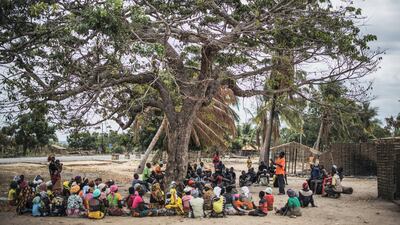ISIS-linked fighters have beheaded at least 50 people in northern Mozambique in the latest gruesome killing spree in Cabo Delgado province.
The extremists reportedly chopped up bodies on a football pitch and also decapitated an unknown number of people in a nearby village at the weekend.
Mozambique police chief Bernardino Rafael said women and children had been kidnapped and houses were burnt down in the Miudumbe and Macomia districts.
Extremists in the Muslim-majority, gas-rich province have wreaked havoc since 2017, with as many as 2,000 killed and roughly 430,000 displaced. The extremists have preyed on the impoverished, jobless youth in the area to bolster their forces.
In April, militants shot dead and beheaded more than 50 young people for allegedly refusing to join their ranks. The perpetrators pledged allegiance to ISIS last year and have since stepped up their offensive and seized sizeable chunks of territory.
The National reported last month that the Mozambique fighters are acting with the approval of ISIS commanders in Iraq. In August, they captured a strategically important port that serves as a logistics link for a $23 billion natural gas project by French energy company Total. Known locally as Al Shabab – although not linked to the Somalian group of the same name – the group launched its first attack in October 2017.
The group has staged more than 600 attacks across 10 out of the 17 districts in Cabo Delgado province, according to a US-based NGO, the Armed Conflict Location & Event Data (ACLED) group.
Earlier this month at least 40 civilians fleeing the violence drowned when their boat sank.
Around 10,000 people fled to the provincial capital Pemba via boat two weeks ago, Doctors Without Borders (MSF) said, raising concerns over access to clean water and highlighting the precarious situation for displaced locals.
“They were dehydrated. Women gave birth at sea. There have been cases of severe and potentially fatal diarrhoea,” said Joaquim Guinart, MSF project coordinator in Cabo Delgado.
“There’s a lot of pressure on local medical staff as 20,000 people have arrived throughout the last month, and more will continue to come.”
MSF says at least 20 local health care facilities have been destroyed because of the conflict.
Mozambique’s government has appealed for international help because of its poorly trained and equipped security forces, and has had to resort to foreign mercenaries to try to fill the gap.
Last month, the European Union said it would support the fight against terrorism in Mozambique, following an appeal by the country’s foreign minister.
Veronica Macamo said Mozambique needed technical, medical and training assistance.
Amnesty International said Al Shabab was responsible for “untold suffering” in Cabo Delgado.
“They have reduced people’s homes to ashes through co-ordinated arson attacks, killed and beheaded civilians, looted food and property and forced hundreds of thousands to flee their homes,” said Deprose Muchena, Amnesty International’s director for east and southern Africa in October.
But he said Mozambique forces also appeared to be guilty of crimes too.
“There is evidence the security forces have also committed crimes under international law and human rights violations, including enforced disappearances, torture and extrajudicial killings,” he said.


